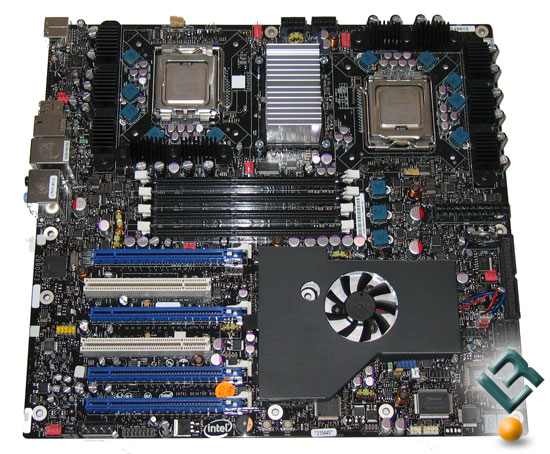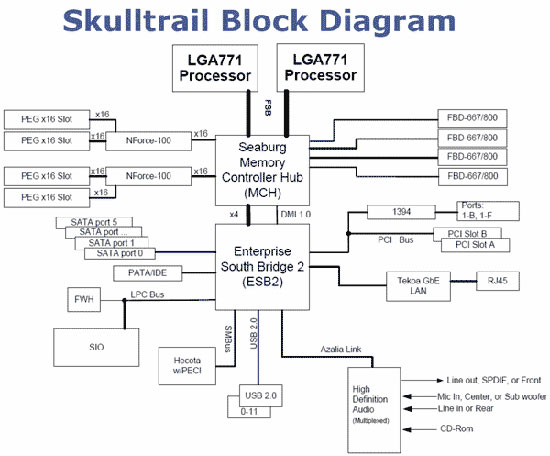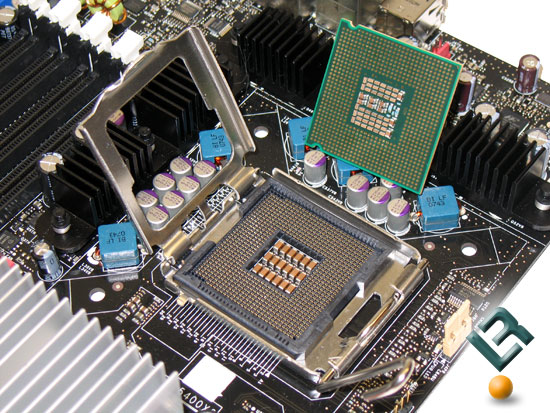Skulltrail Enthusiast Platforms Arrive
When AMD launched the QuadFX system it got Intel pondering the thought of a high-end desktop PC platform based on workstation-class chips. Intel responded just two months later and showed off the V8 test system with eight cores of processing power! Six months later Intel had two Xeon X5365 processors and the Intel S5000XVN workstation motherboard that made up the V8 system in our hands and the benchmarks showed Intel had nothing to worry about from QuadFX. Sadly, AMD ended the QuadFX program not even a year after it was launched, but that didn't stop Intel from releasing another V8 system with the code name - Skulltrail. Legit Reviews first spotted Skulltrail at the Intel Developer Forum last fall and found out that this board would support both ATI Crossfire and NVIDIA SLI video card technology, which is neat to say the least. It was originally said to support Triple-SLI and maybe even Quad-SLI since the motherboard supports four x16 PCI Express lanes, but that seems to have changed in recent months. In the days leading up to the launch of Skulltrail this statement was sent out by NVIDIA:
There are rumors that 3-way SLI on Skulltrail could be enabled with a driver from NVIDIA. Just wanted to inform you that Skulltrail motherboards use two NVIDIA nForce 100 SLI MCPs. The nForce 100 SLI chip allows a maximum of two GeForce graphics cards to work together, enabling SLI between two GeForce GPUs such as the GeForce 8800 GTX, and enables Quad SLI on dual-GPU graphics boards such as the GeForce 7950 GX2. The nForce 100 SLI MCP will NOT support 3-way SLI. This cannot change even with a driver/bios update.
Seems just two card SLI is available on Skulltrail, but that is great compared to not being able to run SLI at all. Without further ado, lets take a look at Skulltrail and get to it!

The Intel Skulltrail platform consists of the Intel D5400XS motherboard that supports two LGA771 based processors at 1066/1333/1600 bus speeds, for up to 8-core processing. The Skulltrail configuration that we are looking at today consists of a pair of Core 2 Extreme QX9775 processors. The Intel D5400XS supports both Core 2 and Xeon LGA771 processors, so if you are worried about the budget alternate CPU's are available at various price points. The Intel D5400XS is basically a workstation board and as such uses the EATX format, so a larger chassis will be needed. The D5400XS uses up to four slots of FB-DIMM dual-channel memory at either DDR2 667MHz or 800MHz speeds. This might be the last time we see FB-DIMM's on the high-end enthusiast platforms as rumor has it that Intel might be going to DDR3 memory. Notice that the MCH is passive cooled, but the pair of NVIDIA nForce 100 chipsets and south bridge are actively cooled.

Other board features are what one would expect on a high-end enthusiast motherboard and include 4 PCI Express x16 (1.1) slots, 2 PCI slots, Intel High Definition Audio, Intel Matrix Storage Technology (RAID 0,1,5,10), Intel PRO 10/100/1000 LAN, 10 USB 2.0 ports, 8 SATA 3.0 Gb/s ports (including 2 eSATA), and a Parallel ATA (2 devices) connector. As mentioned previously the PCI Express lanes support both SLI and CrossFire technology. Since the NVIDIA nForce 100 chips are being used PCI Express 2.0 support is out the door, so PCI Express 1.1 will have to do.

Intel recommends a kilowatt or better PSU for a system with 4GB of memory, two GPUs, and two CPUs. If you want to run four GPUs and 8GB of memory, they recommend a PSU rated for over 1400W! Legit Reviews has a few PC Power & Cooling Turbo-Cool 1kW-SR power supplies laying around and was able to make do with one and had no problems with 4GB of memory and a pair of GeForce 8800 GTS 512MB video cards running SLI. Remember Intel D5400XS motherboard has dual eight-pin aux power connectors in addition to the 24-pin ATX connectors, so you'll need a power supply that has the right connections.

Before we move on we have to show the LGA771 socket and the unlocked Intel Core 2 Extreme QX9775 processors we will be using for testing. Clocked at 3.2GHz, these 45nm processors with dual 1600MHz front-side buses are sure to perform great. They are based on the LGA771 Xeon (Harpertown) architecture even though they have a feature list that is nearly identical to the Intel Core 2 Extreme QX9770. Intel informed us that this setup will offer a total of 25.6GB/s of bandwidth, so this is hands down the most powerfull system that we have ever looked at. The processors are also part of the reason for the high power supply requirements as these 3.2 GHz quad-core processors with dual 6MB chuncks of L2 cache have a TDP rating of 150W. This TDP is just a little bit higher than the 136W TDP of the QX9770, but otherwise, they are virtually equivalent processors. It will be interesting to see what cooling solutions enthusiasts come up with for this platform!
No comments:
Post a Comment